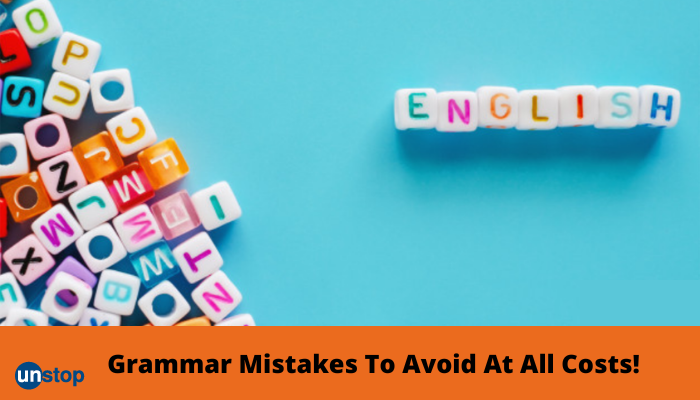English grammar rules that rule all our communication!

"Communication works for those who work at it.” -By John Powell. Communication has always held a high place in the business world. Given the current times when everything from meetings to classes, has gone virtual, the need to communicate effectively has increased even more so. When in an official setup English is the preferred language, and being crisp always helps. While it is a widely spoken language, it is easy to make mistakes when you write English. The English grammar rules used in written English might prove to be quite uncommon as compared to the large number of people who use the language.
Incorrect grammar is literally the bad manners of the literary world. So here are some English grammar rules converted into easy tips to help you brush up your communication skills! (And probably save you from catastrophes!)
The transition words - AND and BUT:
Very often, especially while writing long pieces, it is important to maintain a flow that makes the piece easier to read. Our trusty And and But make the shift from one paragraph/sentence to another more effective.
The conjunctions and and but are the best words because they fit in the next sentence with the previous one. They are more effective than the transition words like additionally or however which require a comma, and are lengthy, with more syllables behind them. While writing your next paper, email, or project use these to string together facts and information to narrate your wonderful work.
Subject-verb agreements - I didn’t know / I didn’t knew?
The subject and verb of a sentence have to be in the same number - either singular or plural. This is a fairly common mistake seen in e-mails, SOPs, and CVs. This is also one of the first English Grammar rules taught but never emphasized enough upon.
This rule is better understood by an example:
Incorrect: The best things in my life is my job and my dog.
Correct: The best things in my life are my job and my dog.
The subject here is ‘the best things’ in the speaker’s life, which is plural. Hence the verb ‘are’ will be used. Which is why it is ALWAYS ‘I didn’t know’ and not ‘I didn’t knew’.
The apostrophe - It's a dilemma
This one is quite simple. An apostrophe (‘) is important ONLY when a missing piece of the word is signified. For example: Didn’t, Couldn’t, What’s.
Therefore, when you use ‘It’s’, it means that the word means ‘it is’ or ‘it has’. When you use ‘its’, it signifies possession or something that belongs to the subject.
For example:
It’s a great opportunity! (signifying that IT IS a great opportunity)
The dog loves its toy. (The toy in question belongs to the dog)
Correlative conjunctions - don’t leave either hanging
Correlative conjunctions are the conjunctions that work in pairs (either, or; both; and; neither’ nor) as long as they are not used as subjects. Now this mistake does not occur very frequently with simple sentences such as:
You cannot waste either, time or money.
But when joining clauses/phrases, it can get tricky. In this case, the verb relating to both the clauses must appear BEFORE the first correlative conjunction.
For example:
Incorrect: We not only helped the Noida branch but also the Delhi one.
Correct: We helped not only the Noida branch but also the Delhi one.
Another additional detail here is that when the either/or or neither/nor pair is used in the subject position, the second element controls the number of the verb.
Example:
Neither my friends nor my father likes the idea of leaving me alone. (The second element, ‘my father’ is singular)
Either the cat or the birds are always in need of food. (The second element, ‘the birds’ is plural)
Adverb - How are you doing? I am doing well.
In a formal interview/conversation, the beginning is usually ‘Hello, how are you doing?’. The response to this sentence can range from ‘I am fine, thank you.’ to simply stating ‘Great.’ The response ‘I am doing good’, however, is incorrect. Here, ‘good’ is used as an adverb and its adverb form is ‘well’.
Therefore when you walk into an interview and they ask you how you are doing, you say, ‘I am doing well.’
Superfluous commas, that, make you, feel, strange
Sometimes while writing an email or letter to an institution, we mention a number of things that we want to convey. The use of commas in long, descriptive sentences seems like a thing that would make your email/query look more presentable. It is often unnecessary.
For example:
Incorrect: I want to work in accounting, or finance.
Correct: I want to work in accounting or finance.
Comma Catastrophe - I would rather eat Dad
Unlike superfluous commas, some commas are necessary to complete the meaning of a sentence. Punctuation is an important part of English grammar, but its rules are sometimes difficult to understand. A simple example can make this clear.
We will now learn to cut and paste kids!
might sound less psychotic as
We will now learn to cut and paste, kids!
Sentence Sprawl - Take a little break, have a snack, listen to some music, relax, and then we will discuss this further.
Long sentences never fare well with readers. Your sentence should not involve weighted phrases making it difficult to comprehend and read. For example, the above sentence will be better written as:
Take a little break. Have a snack, listen to some music, and relax. Then we will discuss this further.
Colon mistakes: a recommendation
A colon serves the purpose of ‘introduction’. It is always used after a complete sentence. It signals that what follows, explains the sentence preceding the colon.
For example:
Incorrect: You should hire me because: great communication skills, fluency in English, and experience in HR.
Correct: You should hire me for these reasons: great communication skills, fluency in English, and experience in HR.
A comma; or a semi-colon?
This one is quite easy to understand. But it also happens to be a common mistake in CVs, projects, cover letters etc. Here’s a sentence -
She saw the Himalayas; in all their glory.
This sentence uses the colon incorrectly. It would correctly be written with a comma. However, in the next example, the semi-colon is correctly placed.
She saw the Himalayas; they stood in all their glory.
The difference in these two sentences is that in the latter, the second part of the sentence is a complete thought. Whereas, in the former sentence, ‘in all their glory’ does not have complete meaning.
These rules might sound tiresome, and concepts like creative license might make you wary of them. But remember, that lack of proper grammar often turns out as a negative point in any written piece. A writer loses the interest of the reader the second a grammatical error occurs in your piece. Even in conversation, the listener is hooked when the speaker has command over the language. It is natural if you lose flow when English isn't your first language. However, there is nothing a little practice in the English grammar rules cannot solve!
Here are some other articles that talk about other important skills!
Login to continue reading
And access exclusive content, personalized recommendations, and career-boosting opportunities.















Comments
Add comment